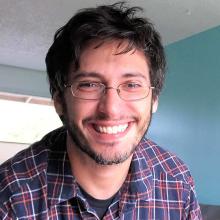COMPANY SPOTLIGHT: ATHENA BUILDING PERFORMANCE
NESEA's new BuildingEnergy Access program serves companies led by people historically underrepresented in the architecture, engineering, construction, and clean energy industries. This cohort-based program gives business leaders the opportunity to connect with the resources of NESEA's programs and community.
Each month, we'll meet a new member of the first cohort. I recently had the opportunity to talk with Margo Valdes, owner of Athena Building Performance, a South Hadley, Massachusetts-based weatherization contracting company, to learn more about her background, company, and the beginning of her Buildingenergy Access experience.
Ian Reed: To begin, can you share a quick overview of Athena Building Performance and the work you do?
Margo Valdes: Sure; we're a weatherization contracting company that provides air sealing and insulation for single and multi-family residential homes. We work with private clients as well as under the MassSave program and with local Community Action Councils across the state, mostly in Western Mass. We predominantly serve the western part of the state; from Worcester to the west. We have over 30 years of combined experience, both in consulting on high-performance buildings and also in weatherization installations. So we can solve pretty much any weatherization related problem that anyone has. We can figure out what should be done and how, and then we can do it.
How long have you been in business?
MV: Coming up on a year.
Oh, congratulations!
MV: Thank you! We're a young company. The company came into existence on August 1st of 2023. We got on the road, actually doing installs, at the end of January 2024. And it's been just going great. We kind of got started rolling and we haven't stopped. I was really fortunate to find a great first hire - our Field Manager - who helped us grow our crew.
That's awesome. How has it been working with the MassSave program? Have you found that's been a good partnership?
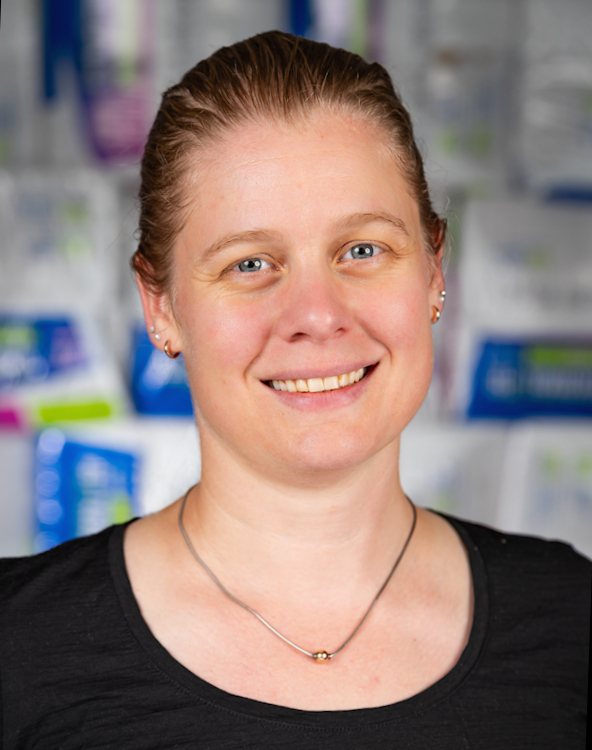 MV: It is. I worked for CLEAResult and I worked for CSG (Conservation Services Group) before that, so I started my career kind of under that MassSave umbrella. Although I wasn't doing the ‘MassSave work’; I was working in the consulting group, where I was a HERS rater and rated new construction. I was always sort of tight-knit with the MassSave program. I'm very grateful because that's how I started my business. I was in consulting for over 15 years, and decided I wanted to have a little bit more control over the quality of the installation. When I decided I wanted to start a weatherization contracting company, the MassSave website laid out how to do it. They laid out how to be a MassSave contractor specifically, but what they actually laid out was the path to becoming a contractor in general. They point you towards all the things that you need: Construction Supervisor’s License, Home Improvement Contractor license, the insurances, the courses we needed to take, the equipment we needed to have and so on. Their checklist became my checklist, and it helped me then meet the requirements for all the other programs that we work with. MassSave has been really, really helpful.
MV: It is. I worked for CLEAResult and I worked for CSG (Conservation Services Group) before that, so I started my career kind of under that MassSave umbrella. Although I wasn't doing the ‘MassSave work’; I was working in the consulting group, where I was a HERS rater and rated new construction. I was always sort of tight-knit with the MassSave program. I'm very grateful because that's how I started my business. I was in consulting for over 15 years, and decided I wanted to have a little bit more control over the quality of the installation. When I decided I wanted to start a weatherization contracting company, the MassSave website laid out how to do it. They laid out how to be a MassSave contractor specifically, but what they actually laid out was the path to becoming a contractor in general. They point you towards all the things that you need: Construction Supervisor’s License, Home Improvement Contractor license, the insurances, the courses we needed to take, the equipment we needed to have and so on. Their checklist became my checklist, and it helped me then meet the requirements for all the other programs that we work with. MassSave has been really, really helpful.
Finding information that you can trust can be so difficult. Having the right information and having it laid out for you is a fantastic resource.
Margo: Absolutely. You can definitely consider it a trusted resource because they answer to big bosses. <laugh>
<laugh>
MV: You know that they are making sure that every box is checked and everyone has everything they're supposed to have. Just for an example, we have umbrella insurance and we have pollution insurance; those are things that someone who is just sort of getting into the field wouldn't even necessarily know about. So, yes: I'm grateful to the MassSave program.
You mentioned earlier that part of the reason you started your business was the desire to be more hands-on with the work being done. What differences were you seeing between a job that wasn't necessarily so well done and how Athena would do it?
MV: Right before this I worked for a different company, a lot of our work was in a different state. I was the director of the Existing Buildings group. I had a team of energy auditors who would go out and do an energy assessment, and use that info to build an energy model and make recommendations to hit a required performance target. And then we would help make sure the design had those specifications in it, and then we would inspect the work. I found that the quality of air sealing in particular was just not good enough.
We would get out to a site and the air sealer would say, “Well, you only told us to air seal these spots.” We’d say, “Well, there's a huge hole right in the attic flat. You're an air sealing contractor, so seal the holes — that's what you do.” And it was really frustrating because it was sort of like, “Well, I don't have to tell an electrician how to run a wire to a light.” When you say, “I want a light here,” they know there needs to be Romex going to that light. Right? An air sealer should know if there's a big hole in the attic, they should seal the hole. That's the job. So I came at it from the angle of wanting a team of people who are trained well, so they know the reason why they're doing the things they are doing.
The personal connections, right now, are what really warms my heart. As a consultant, we were usually behind a computer working for developers or architects. I would do energy audits on occupied housing, but, you know, it's not the same. Now that we’re working in occupied housing, I’ve been touched by the stories that we get from our crew. For example, we have two people on our crew who share the same birthday. They mentioned it to the homeowners in passing and they made them a cake! Another family had a baby (in the hospital) while we were insulating their house.
<laugh>. Wow.
MV: Actually, they had two babies. They had twins.
Oh, that's so sweet.
MV: So, yes, our work is very personal. We're in people's occupied homes. We're grateful to work for them and I think they're grateful to have the opportunity to go through these programs. And even with the people who are not as easy to deal with, figuring out how to connect and get to them on our team can feel rewarding.
Sure, how do you crack that tough exterior?
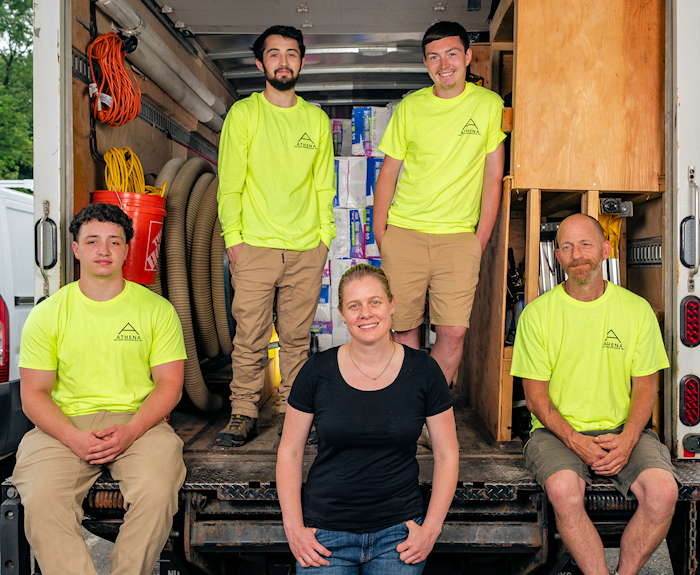
MV: For example, the people who are sitting watching everything our crew does. We had some people like that. The crew was like, “We're never gonna get any work done with these people hovering over us.” And so I went along. The homeowners invited me to sit at their table and they made me coffee and we talked and got to know each other. That’s meaningful to me. The personal touch; the people, the connection, the community... that’s what excites me about what we're doing. We're making people's lives a little bit better in the way that we know how.
I get easily overwhelmed by the big problems of the world. You know, climate change, wealth inequality, and all those things. And when I get overwhelmed, I think, “All right, what I can do is fix buildings. So every building that we touch, we're gonna make that building better. That's the little thing that I can do.”
That's true because we can't change these big problems overnight. It’s the small, incremental changes that will add up to something substantial. Switching gears a little bit, where do you see yourself taking the company in the future?
MV: Honestly, I think the sky's the limit. I think there's so much opportunity and the hardest part is figuring out how to narrow it down. I think it's a tough question. I see a couple of different directions we could go in. Many companies doing our type of work start that way and then add in heat pump installations.
That makes sense, yeah.
MV: In my consulting life, I did residential heating and cooling load calculations and learned the best practices of heat pump installation and things like that. So we could move into that.
Another thing we could do is be a weatherization contractor, but also address barriers. For example, we could have knob and tube removal as part of our services. We could start doing asbestos abatement. The idea would be that when we walk into a house, no matter what we encounter there, we can weatherize that house.
That sounds really appealing from the consumer side. One call takes care of whatever problem you’re having.
Right? So we walk in and we say, “Alright, you've got knob and tube, you've got vermiculite. Let's check both boxes off, and then we can get onto the next part.” I think a lot of people get held up when they bring someone in, they hear “Oh, you have knob and tube, you need to find an electrician before we can weatherize your home.”
Yeah. That's a substantial roadblock.
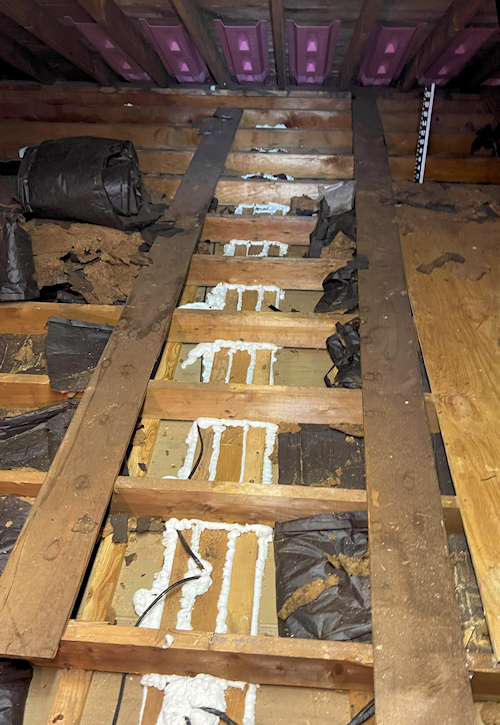 MV: Right. So they might end up just not getting to it. So we'd like to be able to say, look, we could take care of it. We're here. We can do each step of that.
MV: Right. So they might end up just not getting to it. So we'd like to be able to say, look, we could take care of it. We're here. We can do each step of that.
One of our goals is to form relationships with general contractors and architects because we'd like to work on those types of projects as well. I was on the consulting side for so long, and now that I'm on the contracting side, I'd love to be able to bring the expertise that I got as a consultant to these projects. And we can come in and be an installer that understands the bigger picture and understands the things that need to get done. So as a part of the NESEA community, I'm looking forward to making new kinds of connections with people, as a contractor.
Something that’s very important to me is organic growth. I want us to grow organically and slowly. I want this company to be a place where we do good quality work, and we mostly enjoy ourselves in the process.
The path for other weatherization companies often seems like grow, grow, grow, as fast as you can, and get as many trucks and as many crews as you can, so you can do as many houses as you can. That's not my goal. Right now I have one crew that does great work and we get super positive feedback. I want another crew that's like that. I want to make sure that we're able to continue to maintain the quality as we grow.
You mentioned earlier feeling overwhelmed occasionally by the scope of the environmental challenges we're facing, but also the rampant inequity in both our society and in the industry. Will you talk a little bit about how your company is approaching the goals of sustainable growth and equitable work?
MV: Well, I have very high ideals and goals. I think many business owners would identify with the fact that the first priority is to make sure the business can operate because I can't achieve any of those goals if the business doesn't function.
Yep. No way around it.
MV: Right now, we're a startup and the main business focus is to maintain stability. We've been on the road for six months, and the goal is to get to a place where I have more time to focus on the bigger picture company goals.
In the meantime, I'm a trainer at the Green Jobs Academy, and I train in Spanish and English. I'm training people who are just getting into the industry. I went to a BuildingEnergy Boston session two years ago about this topic, and something that I learned was that if I want to build a diverse workforce in my company, I have to focus on the funnel of people coming in - making sure it’s diverse, bringing in all kinds of people. So part of my goal and my mission as a trainer is to train all different types of people so that there is a diversified pool of people who can do the jobs that are being advertised. Because if you hire someone purely as a diverse candidate and they are not qualified, they will not succeed and that’s not good for anyone. You can't hire strictly for diversity. You have to hire for skills. The solution to that is having a diverse set of people who have the skills that you need. What we need to do in the industry right now is to develop that set of people. So for me, I think that's how I see the problem, that's how I see my approach. It is not just about hiring. The first step is developing the workforce. And if I can be a trainer, then I can be right there with that workforce, making sure they’re learning the skills they need. And of course, it’s also a direct connection with those people, who I could then bring into my company.
The overlap between training and intention is really interesting. By training the people entering the field, you have a chance to influence what you’d like to see the workforce be like. That kind of intentionality around building the business also seems to connect with the work being done in BuildingEnergy Access. Do you think that your involvement in that program's been helpful in that respect too?
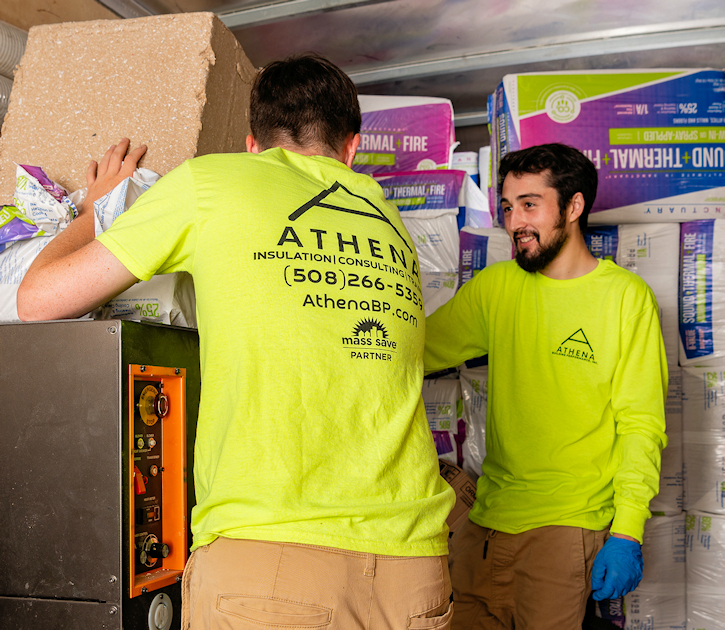 MV: Oh, so helpful. I feel so fortunate that this happened all at the same time. That this Seven Strong opportunity came up right as I started my business.[Note: Seven Strong is the name of the first cohort in the Access program]. I was listening to a podcast with someone talking about entrepreneurship, I think it was on the Harvard Business Review podcast. And they interviewed these really successful entrepreneurs, and all of them said that luck played a major role in their success. And as I listened to that, I was like, “Hey, you know, me too!
MV: Oh, so helpful. I feel so fortunate that this happened all at the same time. That this Seven Strong opportunity came up right as I started my business.[Note: Seven Strong is the name of the first cohort in the Access program]. I was listening to a podcast with someone talking about entrepreneurship, I think it was on the Harvard Business Review podcast. And they interviewed these really successful entrepreneurs, and all of them said that luck played a major role in their success. And as I listened to that, I was like, “Hey, you know, me too!
<laugh>
MV: <laugh> Being at the All Group Gathering [Note: an event celebrating 10 years of NESEA’s Bottom Lines program - ed], it was just so refreshing, because I try to treat my crew really well, and people look at me like I'm nuts; <laugh> other people who work in the construction industry and aren't connected with Bottom Lines. They think I'm absolutely nuts and I was feeling really self-conscious about that. Honestly, when I went into that meeting, I was thinking, “Am I a fool? Am I treating my people too well?” It was incredible to meet other business leaders in the program who want the same for their teams. When I left that meeting, it felt like, “Oh…<exhale> I found my people!” <laugh>
I came out of that meeting feeling much more grounded. Like, “Oh, I CAN do better. I'm allowed to do better.”
Have you found that there's been practical advice that's also helpful for more of the nuts and bolts aspect of running the business?
MV: Absolutely. Especially the HELM consulting sessions I’ve had through the program, they were fantastic. The financial education and the layout that they provided were so helpful, and just talking to other business owners about how they would do things is always valuable. There are already some of the people in my group that I've come to rely on. I'm so grateful.
Thank you for taking the time to speak with us today.
MV: Thank you.
Our Mission
NESEA advances sustainability practices in the built environment by cultivating a cross-disciplinary community where practitioners are encouraged to share, collaborate and learn.



